Coordination
Background
Effective coordination can prevent gaps and overlaps in humanitarian responses, ensure the impact of CVA is optimised for the benefit of crisis affected populations, whilst also making the most of limited humanitarian funding. But the CALP Network’s State of the World’s Cash report found that cash coordination is seen as weak and ad hoc, and that this is having serious operational impact.
Ninety-five donors, international and national NGOs, private sector actors and one UN agency have called for clarity on two key issues surrounding cash coordination:
- Who should be accountable for ensuring effective cash coordination, and
- What the scope of Cash Working Groups should be, including in relation to multipurpose cash.
We urgently need to build on what works and provide clarity at the global level on the questions above, whilst adapting to different contexts. Clear decisions based on the impact on affected populations rather than agency politics are long overdue.
Current priorities
We aim to contribute to progress on this issue on three levels: supporting Cash Working Groups at the regional level; contributing to practical solutions for cash coordination at the global level; and convening evidence-based discussion on the key issues, highlighting critical decision points and opportunities for progress.
Featured content

Cash Coordination – LIVE timeline
Page
The latest updates on cash coordination as they unfold.

95 Organisations Sign Letter Calling for Strengthened Cash Coordination
News
Today a letter signed by 95 organisations was handed into the Emergency Relief Coordinator (ERC) urging the Inter-Agency Standing Committee (IASC) to take a decision on the leadership and scope of cash coordination in the coming year.

Is cash transforming the humanitarian system or is the system limiting how cash is used?
Blog Post
At the State of World’s Cash 2020 launch event, Sorcha O’Callaghan, Director of Humanitarian Policy Group at ODI warned that, “Cash offers a huge transformative potential, but as far as the system is privileging the interest of the agencies over people in crisis, we won’t be able to see it”. If you missed the State of the World's Cash 2020 launch we're sharing highlights. Quote 4...
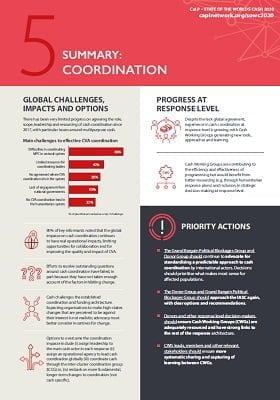
State of the World’s Cash 2020 Chapter 5 summary: Coordination
Report
There has been very limited progress on cash coordination since 2017. Cash continues to challenge the established coordination and funding architecture, and efforts to resolve outstanding questions around cash coordination have failed. Despite the lack of global agreement, Cash Working Groups are pushing forward and contributing to improved programming, and generating new approaches. This...

Cash Coordination Tip Sheet
Guidelines and Tools
This tip sheet sets out established best practice, key guidance and resources for all aspects of cash coordination, intended as a clear, accessible and action-oriented guide for those engaged in coordination of cash and voucher assistance (CVA) at the field level.

Introducing the Cash Coordination Tip Sheet
Webinar
The CALP Network has developed a tipsheet setting out established best practice and key guidance and resources for all aspects of cash coordination, intended as a clear, accessible and action-oriented guide for those engaged in coordination of cash and voucher assistance at the field level.

Cash Coordination: A proposal from members in MENA
Blog Post
Earlier this year the CALP Network undertook regional consultations to explore options for cash coordination. This blog lays out recommendations from participants from the Middle East and North Africa who sketched out what cash coordination, and coordination more broadly, could look like in future to support a more effective, efficient and accountable response.
Thematic lead
Latest

Protection in Cash Based Interventions – Interviews with Richard Nunn and Lou Lasap
Blog Post
As part of an ECHO-funded Enhanced Response Capacity grant, UNHCR in partnership with WFP, Oxfam GB and the Cash Learning Partnership held an inter-agency workshop on cash and protection in Nairobi on the 10-12th March. The workshop brought together cash and protection practitioners to reflect upon...
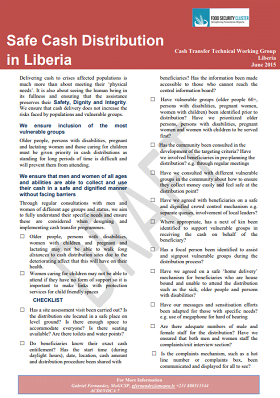
Safe Cash Distribution in Liberia
Report
Delivering cash to crises affected populations is much more than about meeting their ‘physical needs’. It is also about seeing the human being in its fullness and ensuring that the assistance preserves their Safety, Dignity and Integrity. We ensure that cash delivery does not increase the risks faced...
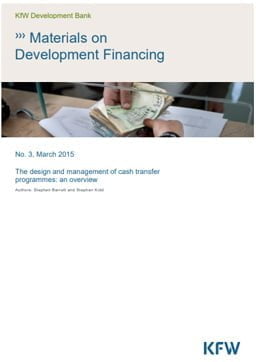
The Design and Management of Cash Transfer Programmes: An Overview
Policy paper
This paper describes and explains the operations of cash transfer schemes, outlining good practice in the design processes required to operationalize policy-level design principles. It describes the four key components comprising the administrative structure of most cash transfer programmes and, based on...
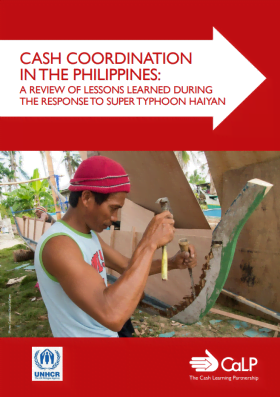
Cash Coordination in the Philippines: A review of lessons learned during the response to Super Typhoon Haiyan
Report
In the last five years there has been a growing trend towards the use of cash transfer programming (CTP) as a response modality in emergencies across the humanitarian sector. The fungibility of cash, when provided without restrictions, offers increased choice for affected populations to...
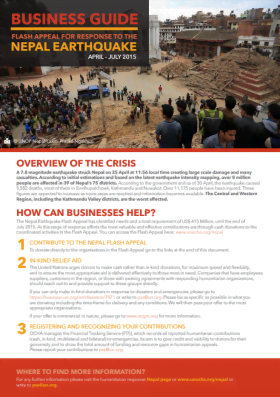
Business Guide – Flash appeal for response to the Nepal earthquake
Policy paper
An overview of the main humanitarian issues facing Nepal following the 2015 Earthquake, as well as indicators as to how businesses can assist with disaster response.

Liberia Ebola Response
Presentation
ICRCs EVD Cash response program had to be designed under a rare circumstance of insufficient baseline data on EVD impact on household level and limited opportunity to contact intended beneficiaries for a detailed assessment/ proper situational analysis.
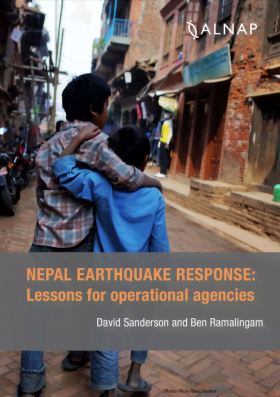
Nepal Earthquake Response: Lessons for operational agencies
Policy paper
In the aftermath of the April 2015 earthquake in Nepal, this paper looks at lessons drawn from previous comparable disasters and seeks to provide invaluable information and assistance to the operational agencies responding to the crisis. Seventeen Lessons give an overview of important learnings based on...
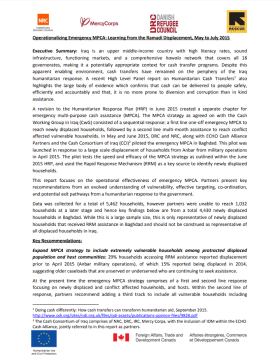
Operationalizing Emergency MPCA: Learning from the Ramadi displacement, May to July 2015
Report
Iraq is an upper middle-income country with high literacy rates, sound infrastructure, functioning markets, and a comprehensive hawala network that covers all 18 governorates, making it a potentially appropriate context for cash transfer programs. Despite this apparent enabling environment, cash transfers...

Markets in Crises: South Sudan case study
Report
Not long after achieving independence, South Sudan descended into conflict, which has fuelled displacement and food insecurity.Although markets continue to function in the country, humanitarians have paid relatively little attention to market-based responses to the crisis. Looking primarily at Juba, this...
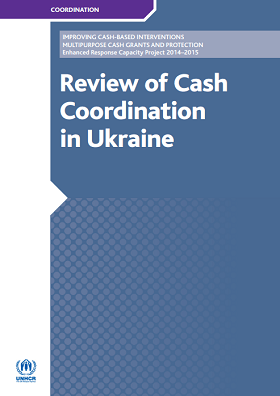
Review of Cash Coordination in Ukraine
Report
Ukraine is a lower middle-income country in Eastern Europe, with a strong soviet era legacy in the field of social protection. Since early 2014, Ukraine has been affected by conflict in its eastern part, which led to the internal displacement of more than 1.4 million people. At the time this paper was

A Review of Evidence of Humanitarian Cash Transfer Programming in Urban Areas
Report
Urban poor populations frequently experience disasters of varying typology and intensity. When set against a backdrop of poverty and marginalisation, their needs can be complex. As recent urban crises have pushed humanitarian agencies to respond in urban areas, this literature review examines the...
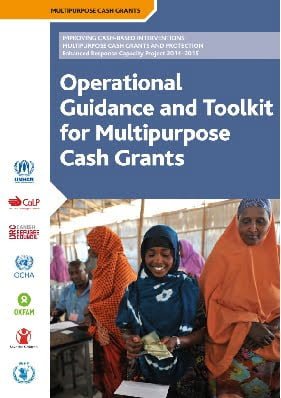
Operational Guidance and Toolkit for Multipurpose Cash Grants
Guidelines and Tools
This operational guidance and toolkit brings together worldwide expertise on cash-based interventions (CBIs). It provides comprehensive and practical guidance for humanitarian actors to assess the feasibility, conceptualise the design and structure the implementation of MPGs. The guidance focuses on...

Are Public Works Programmes Effective in Reinforcing Social Protection Systems? Evidence from Northern Namibia
Report
This paper analyses the effectiveness of public works programmes (PWPs) in creating employment, reducing poverty and reinforcing the existing social protection system in Namibia. Using data and information from a survey conducted in northern Namibia, it is established that while public works programmes...

Evaluation of the OneCard Pilot in Lebanon
Report
The OneCard pilot is part of the WFP-UNHCR Joint Plan of Action for Cash and Vouchers (2014), which aims to implement cash and vouchers using common e-delivery mechanisms. The objectives of the OneCard pilot were: To test the programmatic, technical, and financial efficiency and feasibility of the...

A case for cash: crisis and disaster-affected populations’ perspective
Report
As the number, scale and duration of humanitarian crises increase, the provision of cash to affected people and communities presents a number of opportunities for more effective and efficient programming. The means by which such opportunities can be maximised is a source of ongoing debate involving a wide...

Cash Transfer and Community Resilience Programming in South Central Somalia
Blog Post
The Building Resilience in Central Somalia (BRCiS) attempts to provide immediate humanitarian assistance as well as developing longer term local capacity through a combination of locally adapted cash-for-work and unconditional cash transfers.

Cash Transfers: Progress made but challenges remain
Blog Post
In five years cash programming has come from almost nowhere to being – for some donors at least – the preferred option, especially in the field of food and nutrition. “We no long measure food aid contributions in wheat/tons equivalent,” says Julia Stewart-David of the EU aid body, ECHO. “That...
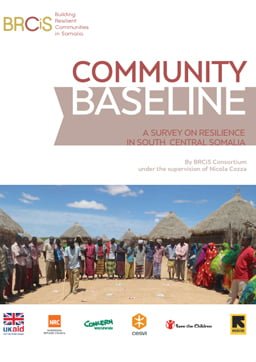
Community Baseline: A Survey On Resilience In South Central Somalia
Report
A comprehensive understanding of the socio-economic and environmental context of intervention is essential to the success of any resilience-building program. Based on this premise, the BRCiS has taken a series of steps to strengthen its knowledge and understanding of key variables and dynamics in its...

Community Baseline: A Survey On Resilience In South Central Somalia Summary
Report
A comprehensive understanding of the socio-economic and environmental context of intervention is essential to the success of any resilience-building program. Based on this premise, the BRCiS has taken a series of steps to strengthen its knowledge and understanding of key variables and dynamics in its...
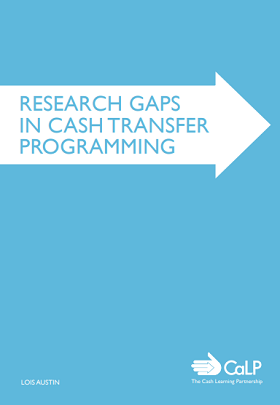
Research gaps in cash transfer programming
Report
Gathering evidence through action research is one of the ways that the CALP Network aims to improve cash transfer programming (CTP) implementation and raise awareness about CTP and its use as an appropriate and effective mechanism for emergency response. Before defining potential research topics for 2014,...



